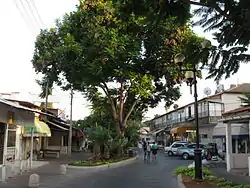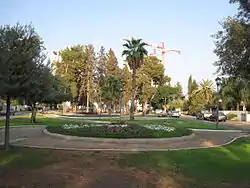Yehud
Yehud (Hebrew: יְהוּד) is a city in the Central District in Israel that is part of the joint municipality of Yehud-Monosson. In 2007, Yehud's population was approximately 30,000 (including Neve Monosson – see below).[1]
Yehud
יְהוּד | |
|---|---|
| Hebrew transcription(s) | |
| • ISO 259 | Yhud |
 | |
 Yehud Location within Israel's Central District  Yehud Yehud (Israel) | |
| Coordinates: 32°2′0″N 34°53′0″E | |
| Country | |
| District | Central |
| Founded | 2000 BCE (Earliest settlement) 1500 BCE (Israelite town) 1596 (Arab village of al-Yahudiya) 1953 (Israeli city) |
| Government | |
| • Mayor | Yaela Machlis (Yehud-Monosson) |
| Area | |
| • Total | 4,100 dunams (4.1 km2 or 1.6 sq mi) |
| Population (2007) | |
| • Total | 25,604 |
| • Density | 6,200/km2 (16,000/sq mi) |
| Name meaning | Named for Biblical location |
History
Parts of Yehud are located on the land of the Palestinian village of al-'Abbasiyya, which became depopulated in the 1948 Arab–Israeli War.[2]
In June 2011, the city's officials announced they would undertake a massive construction project to replicate the old town square of the Swiss city of Lugano in the center of their city, to reinvigorate commerce and tourism. The replica will be replete with neoclassical columns and colonnades. This project was scheduled to be finished and in fall 2016. It opened in early 2018[3]
Local government

In 2003, the Yehud-Monosson Municipality was formed to provide municipal services to Yehud and the neighboring community of Neve Monosson (pop. 2,600). Under the terms of the merger, Neve Monosson remains with a high level of autonomy under the Neve Monosson Local Administration (minhelet). The Neve Monosson Local Administration was granted municipal status as an autonomous borough (vaad rova ironi) by the Interior Minister in 2005 within the implementation of the merger plan. In a practical sense, the Yehud-Monosson Municipality really functions as the municipality of Yehud whilst providing basic statutory municipal services to Neve Monosson on an outsourcing basis.
Demographics
According to CBS, in 2001 the ethnic makeup of the city was all Jewish. See Population groups in Israel. According to CBS, in 2001 there were 10,500 males and 11,100 females. The population of the city was spread out, with 33.4% 19 years of age or younger, 16.1% between 20 and 29, 19.9% between 30 and 44, 18.8% from 45 to 59, 2.9% from 60 to 64, and 8.8% 65 years of age or older. The population growth rate in 2001 was 2.6%.
Economy
Yehud serves as the base of the large Africa Israel Investments company majority owned by Lev Leviev.
The control room of SpaceIL is in Yehud. From that base, SpaceIL manages the operations of the Beresheet lander.[4]
Education
According to CBS, there are 10 schools and 5,159 students in the city. They are spread out, as 6 elementary schools and 2,252 elementary school students, and 5 high schools and 2,907 high school students. 54.2% of 12th grade students were entitled to a matriculation certificate in 2001.
Sports
Football: (Soccer) Hapoel Yehud spent several seasons in the top division of Israeli football during the late 1970s and early 1980s, and won the State Cup in 1982. However, after several relegations the club folded in 1998. A new club, Hapoel Ironi Yehud, was established in 2004 and currently plays in Liga Gimel. (Division III)
Notable residents
- Yonit Naaman, essayist, editor, and researcher
- Golan Pollack (born 1991), Olympic judoka
- Shlomi Shabat, vocalist
References
- "היסטוריה". Yehud-Monoson municipality. Retrieved 14 November 2015.
- Khalidi, W. (1992). All That Remains: The Palestinian Villages Occupied and Depopulated by Israel in 1948. Washington D.C.: Institute for Palestine Studies. p. 235. ISBN 0-88728-224-5.
- "Sleepy Israeli Town to Reconstruct Replica of Italian Neighborhood", Haaretz
- Oster, Marcy (March 26, 2019). "Wanna See the Sunrise from Space? Israeli Craft Beresheet Has the Video". The Jerusalem Post. Jewish Telegraphic Agency. Retrieved March 26, 2019.